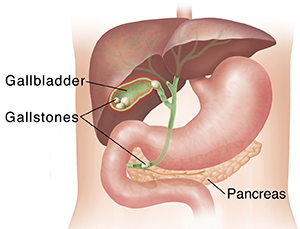Understanding Pancreatitis
Understanding Pancreatitis

Symptoms of acute pancreatitis
Symptoms include the following:
Severe pain in your upper belly radiating to your back
Nausea and vomiting
Belly swelling and tenderness
Fever
Rapid pulse
Shallow, fast breathing
Treating acute pancreatitis
If you have acute pancreatitis, you may be in the hospital for a few days. For part of this time, you likely won’t be allowed to eat or drink. This lets your pancreas rest and heal. If your pancreatitis is severe, you will not be able to eat and drink and you may receive nutrition and fluids through a feeding tube inserted into your belly. Medicines are given to help ease any pain.
Causes of pancreatitis
Gallstones are one of the most common causes of pancreatitis. These hard stones form in the gallbladder, an organ located near the pancreas. These two organs share a passage into the small intestine called the common bile duct. Fluid can't leave the pancreas, though, if gallstones block this duct. The fluid backs up and causes pancreatitis. Alcohol is also an extremely common cause of pancreatitis. Certain medicines, trauma, and infection can also cause pancreatitis. Problems with the structure of the pancreas may also be a cause. There are also genetic problems that can cause pancreatitis.
If you have chronic pancreatitis
If the pancreas stays inflamed for a long time, chronic pancreatitis may result. Common symptoms include diarrhea, weight loss, and belly pain. Possible complications of chronic pancreatitis include the following:
Diabetes
Malnutrition (not absorbing enough nutrients)
Pancreatic cancer (rare)
Treatment for chronic pancreatitis includes the following:
Medicines to help the pancreas work (enzymes) and to manage pain
Dietary changes
Stop smoking
Treatment for gallstones
Avoiding alcohol. It cannot be stressed enough how important it is to avoid alcohol and smoking to help manage this disease.
Updated:
March 20, 2017
Sources:
The Management of Acute and Chronic Pancreatitis. Banks P. Gastroenterology and Hepatology.2010;6(2):s1-s16
Reviewed By:
Fraser, Marianne, MSN, RN,Image reviewed by StayWell medical illustration team.,Lehrer, Jenifer, MD